
As a long-time tech journalist, I’ve noticed an interesting trend over the years. Companies who aren’t really tech companies will call themselves that anyway.
This is because “tech” is a lot like “new,” “free,” or “sale.” These words get people’s attention. So a lot of companies say they’re “tech” for the free publicity.
One such company is WeWork, a real-estate company that leases short and long-term office space stocked with free beer, cool lighting, and a community-for-hire for remote workers like myself. Continue reading…
Smartphones have gotten ridiculously expensive. In the last couple of years alone, premium handsets have nearly doubled in price to over $1000. It’s enough to make even the most loyal iPhone fans switch to better value Android phones or upgrade to older but cheaper models instead.
Two new smartphones released this summer are bucking the trend, however. My favorite is the $400 Google Pixel 3a (pictured right). Its camera is not only stunning, but the best of any price range (really!). It has a gorgeous OLED screen, a battery that lasts for days, and a headphone jack. My only quibble is it’s a tad tall and not waterproof.
If you want the fastest phone on the market with the nicest screen and an equally good 4k camera, the OnePlus 7 Pro (pictured left) is also fantastic. Although a little big for my pockets, it’s loaded with a nifty notchless screen and software features that outpace nicer Google or Samsung phones. In short, the OnePlus 7 Pro is basically $1000 phone for less than $700.
Granted, the pesky green text messages of both aren’t as reliable or as good as Apple’s best-in-class iMessage. But outside of that, both come highly recommended with unlimited free photo storage.
Rating: 4.5 out of 5 stars
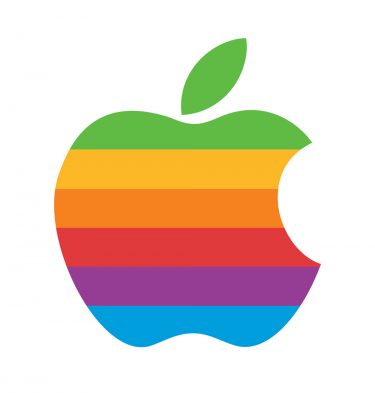 “The reality is that calling a business a ‘tech company’ is a ploy to make it sound exciting to potential consumers and investors, not a method of assigning greater meaning,” aruges David Yanofsky for Quartz. “The moniker says nothing about what type of company it actually is, only that it is a business that uses at least one technology to provide its product or service.”
“The reality is that calling a business a ‘tech company’ is a ploy to make it sound exciting to potential consumers and investors, not a method of assigning greater meaning,” aruges David Yanofsky for Quartz. “The moniker says nothing about what type of company it actually is, only that it is a business that uses at least one technology to provide its product or service.”
He goes on, “The era of tech companies is over. To stay competitive in today’s marketplaces, every company, by the current standard, could be called a tech company, which of course, is another way of saying that none of them should be.”
Nailed it.
 For one reason or another—both personally and professionally—these companies can do almost no wrong in my eyes:
For one reason or another—both personally and professionally—these companies can do almost no wrong in my eyes:
- Dell. I built my first computer as a freshman in high school. Overclocked it, modified it, loved it. Later on, I built several more for family members. And then made-to-order Dell took over the world by the late ’90s. I enthusiastically appreciated their customization, affordability, and no-nonsense style. A decade later, Dell officials hired me as a contract writer for three consecutive years. That engagement largely paid for the downpayment on my first and only house. Although they’ve changed significantly since the ’90s and I now compute on a Macintosh, I still admire them. Continue reading…
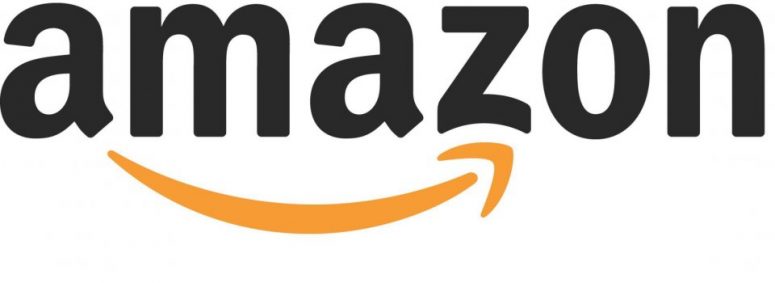
I’m an enthusiastic Amazon, Apple, Uber, and Google user because they make my life easier. I don’t think twice before upping my Prime membership. In fact, I like these companies so much, I’ve even willing to pay a little extra for the convenience they offer.
But obsessive brand loyalty will ultimately hurt us, argue two ivy-league economists for USA Today. “Each of us can do our part to make sure Amazon and others never get to the point of ubiquitous domination. It might introduce a bit of hassle and inconvenience into your life, but only a tiny bit. But by taking on this challenge, you’ll be doing the job that antitrust authorities, in an ideal world, might take care of on our behalf – ensuring that consumers and workers, rather than the owners of capital and algorithms – get a piece of the surplus that’s created by new business ideas.”
Make no mistake, I’m a proud American capitalist. But I like it even more when companies compete for my business. “Think about those credit card teasers we all get,” the authors add. “As long as we keep businesses thinking they need to chase after us to try to lock us in, they’ll keep on handing us value rather than using it to pad their bottom line.”
If you agree, consider shopping with competing companies and platforms from time to time to keep your favorite companies on their toes, hungry for your business, and willing to let you keep a greater share of the value.
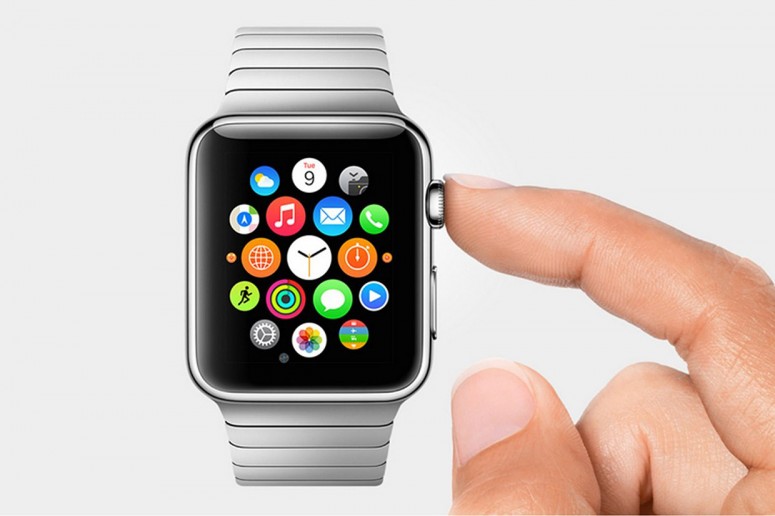
Courtesy Apple
Constantly checking your wrist watch is less rude and less distracting than constantly checking your smartphone. It might even improve your life.
Or so says a report from Wired on why Apple chose to manufacture the forthcoming iWatch, which serves as a second, more accessible screen for your iPocket, I mean iPhone.
“Your phone is ruining your life,” writes David Pierce, who, like many others, ignorantly blames the object instead of the abuser. Rather than setting boundaries on his technology, Pierce and others like him egotistically search for reasons to be elsewhere in thought and suffer the consequence. Continue reading…
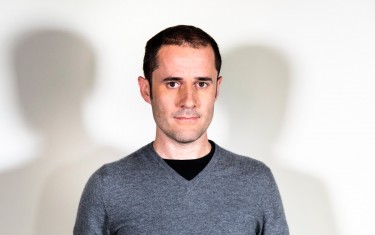
Andrew White/WIRED
Ev Williams believes the internet is “a giant machine designed to give people what they want.” In a speech reported by Wired, the co-inventor of Blogger and Twitter added, “We often think the internet enables us to do new things, but people just want to do the same things.”
For instance, we want to socialize, entertain ourselves, learn, and make work easier. The internet does all four better than any other convenience of the last century.
It does this in two ways, Williams explains. “Big hits on the internet (think Google, Facebook, Apple, Amazon) are masters at making things fast and not making people think… But the internet is not a utopian world. It’s like a lot of other technological revolutions.” Continue reading…
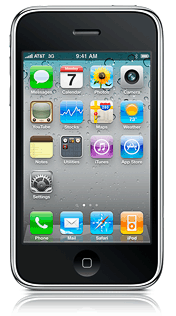 After six (sometimes) productive years, I abandoned the sinking ship that is BlackBerry last week. In it’s place, I upgraded to the “magical,” status-enhancing iPhone.
After six (sometimes) productive years, I abandoned the sinking ship that is BlackBerry last week. In it’s place, I upgraded to the “magical,” status-enhancing iPhone.
As early adopters discovered a few years ago, it’s more than a phone: it’s the greatest piece of personal technology ever invented. Phone, texter, navigator, iPod, mini TV, game console, digital assistant, e-reader, and tiny computer all in one. Not only did it serve as the inspiration for the more popular Android clone, the iPhone is the more organic and less painful version of touchscreen phones, i.e. not unlike what Macs often are to Windows machines.
Of course, like all smartphones, the iPhone can be a total drag on your analog life if you don’t set limits. (In my case, that means shunning a data plan, turning off all alerts except for voice calls, staying away from it as much as possible on nights and weekends, and only connecting to the internet when I need it, as opposed to the more common always-on, always wired, and always distracting “push” internet mode. More on that in my forthcoming book.)
But the iPhone gets a whole lot more right than it gets wrong. In fact, I count only three usability flaws on the device: Continue reading…
[youtube]http://www.youtube.com/watch?v=FVkH9Hgvda4[/youtube]
Using iOS is still less of a pain than using Android. That is, the form is still better.
But that doesn’t change the fact that the attached ad is incredibly effective in speaking to the majority of smartphone users who don’t appreciate, nor do they want to associate with, the millions of off-putting Apple fans parodied above.
In any case, wouldn’t it be great if phones could go back to being useful tools rather than modern day golden calves?
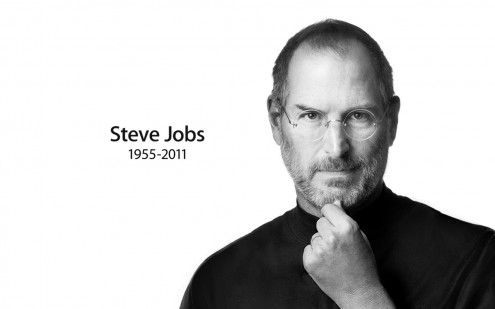
Assuming his biography well represents him, Steve Jobs was a jerk for much of his life. A work-a-holic with eating disorders, incredibly bratty, ruthless.
I’m sure a lot of devout followers will excuse his actions with “no one is perfect.” I prefer that justification, however, for people who are at least trying to improve their social skills with age, instead of sticking to their anti-social guns as Jobs did for much of his life.
Continue reading…
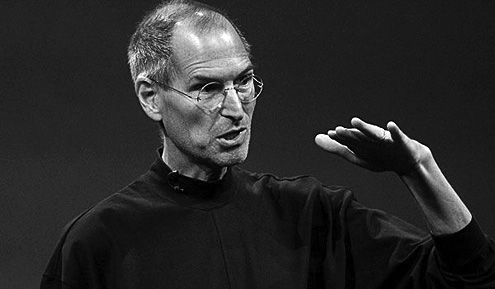 Read it here.
Read it here.
PS – Is it possible to build a company as influential as Apple without sacrificing ones’s personal health and well-being? I wonder.
PSS – I suspect this guy is right in his prediction that Jobs will continue to pull strings so long as he’s alert.
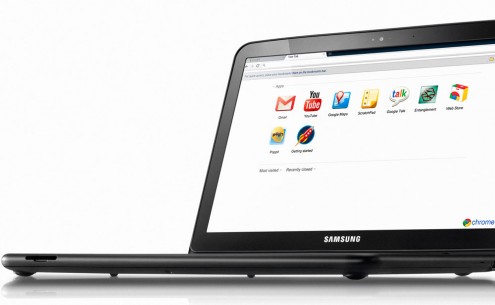
Because that’s what you get when you buy a Samsung Wi-Fi Chromebook.
Admittedly, it’s not a perfect analogy. The Macbook Air is skinnier in the front and capable of 1080p playback, whereas the Samsung Chromebook can only render 720p HD. The former is also made of industrial titanium, whereas the latter uses high-end Macbook-like plastic. And in terms of startup and resume times, the Chromebook is faster—near instantaneous. Continue reading…
Great video, particularly from 2-5 minutes.
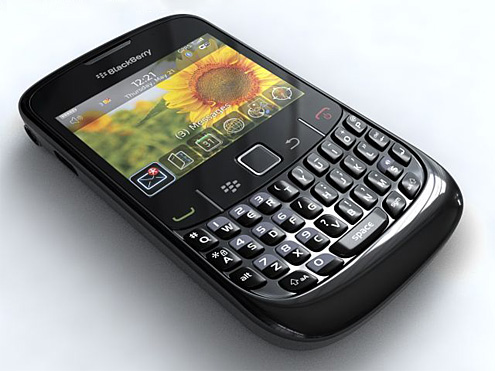
… on the impending irrelevance of Blackberry. This coming from a six-year Blackberry user (but I’m in the minority, and only use it for texting and voice calls now — no portable apps or Internet for me).
In other words, I use a dumbed down smartphone, so I’m not a target candidate.
[youtube]http://www.youtube.com/watch?v=p92QfWOw88I&feature=channel_video_title[/youtube]
A lot of good ideas here—dare I say more than OSX Lion. Would like to see how it behaves with a mouse and keyboard, however.
The owner of the second largest company in America walks into city hall.
Continue reading…
In The Know: Should The Nation’s Unemployed Be Buying New Apple Computers?
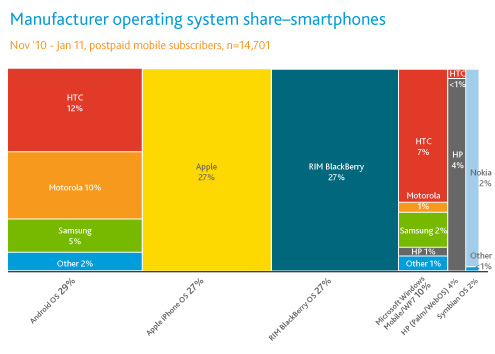
Source: Nielsen
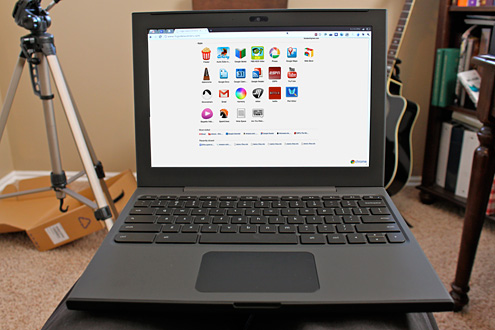
I’ve been using Google’s new Chromebook for over a month now. I use it a lot, often times reaching for it over my Macbook.
Why? It starts and stops faster. In a single second even. It connects to the internet faster. In seconds, mind you. The thing is quick and lightweight. Much like a tablet computer or iPad.
Better still, the Chromebook has a full-size but no-nonsense keyboard, making it the faster and better input device when compared to tablets. And it has a lot more “apps” than closed-system tablets.
Admittedly, the trackpad is finicky. But overall, I’m very impressed with the Chromebook, especially as it’s replaced some of the functions I used to prefer on either my desktop or laptop. It might be the best living-room laptop ever made. And it’s a great travel option as well.
If manufacturers price this thing under $300, I think it will make significant waves in the computing world upon release this summer.
[youtube]http://www.youtube.com/watch?v=vFeD3qGVsrM[/youtube]
I watched the Google Chrome OS demo today and came away impressed. The product won’t meet the need of power-users, producers, and mult-media creators. But for everyone else, including power-users when they don’t need extra power, Chrome OS is the first legitimate consumer rival for both Macintosh and Windows I’ve ever seen. Much more so than Linux ever was (at least in a consumer sense).
Some highlights about Chrome OS, which has a planned release of “mid-2011” in select Acer and Samsung laptops:
- “Nothing but the Web.”
- Chrome OS features a fast and simple setup process, remarkably fast boot times and an instant resume feature to minimize wait time when the OS wakes from sleep.
- Unified experience across Chrome on netbooks, desktops and more.
- Multiple user support and guest mode — everything a user does in guest mode is private and history is deleted instantly when a session is ended.
- Verizon Wireless cellular data connectivity (international options are available as well) in every Chrome OS notebook/netbook — no contracts, no activation fees and monthly plans starting at $9.99.
- Updates are seamless — no user operations are required to update the OS or apps.
- Most secure OS in the world — security is a major focus of Chrome OS; all Chrome OS data is encrypted by default.
- Verified boot — core OS components are in firmware that cannot be modified.
- Enterprise options — Google is working closely with partners like Citrix to ensure the enterprise market is addressed.
- Google’s Chrome OS PCs get faster over time, not slower like other PCs.
- Initial manufacturing partners include Acer, Samsung and Intel.
Will Chrome OS overtake the world? No. But I could see it becoming as ubiquitous as Google’s own Gmail, if not bigger. Which is huge.
In other words, watch this space. Desktop computing is about to change. If only in how we store an access many of our files.
See also: Will Google Chrome OS change computers?
[youtube]http://www.youtube.com/watch?v=1pU1LoZeBYk[/youtube]
My brother-in-law works in a Manhattan commercial music studio, producing jingles and licensing original music for use in advertising. Apparently, he deals with this regularly. Favorite line: “That is insulting. We would go out of business if we agreed to terms like that.”
More proof that unrealistic buyers are everywhere. (Although I still think there is value in licensing consumer music in advertising, which this video seems to discredit in an effort to sell more commercial music. What’s more, if demand is this high for “rip off” commercial music, I imagine a supplying studio could really clean up.)
See also: I’m sorry we can’t make a deal. Please don’t heckle me.
[youtube]http://www.youtube.com/watch?v=ZFeFoL89UQ4[/youtube]
Nice.
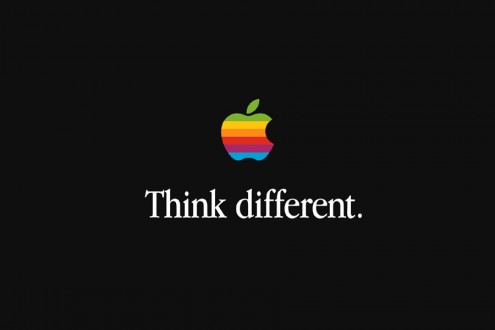
Last month, Apple became the second largest company in America, according to Fast Company. That said, Apple is now bigger than Google, Microsoft, Walmart, General Electric, or any other enterprise not named ExxonMobil.
Wow.
Continue reading…
Written by Chicken Little of the Digital Age
Technology is making us stupid.
Don’t believe me? Read this story about how Apple is now tracking the exact location of iPhone users and sharing it with advertisers.
Or this one documenting numerous Facebook security holes.
Or how have slowly made themselves more vulnerable while broadcasting there whereabouts on Twitter (NOTE TO BURGLARS: When I message that I’m away from home, don’t believe me).
Or the mother of all “You’re freakin’ crazy” behavior: The whole idea behind Foursquare (aka willingly telling the world your precise location so marketers and predators could potentially exploit you.)
I’m not saying the above mentioned technologies aren’t without their advantages. Or that we should shun the use of such technology.
But our intimate relationships with many (if not all) of these technologies have gone too far. As a result, our privacy has been compromised. In many ways, we’ve become our own oppressors. Obsessive sharing might even have consequences on our freedom.
The good news is that much of this can be reversed by hitting the power button or delete button. Of course, you need to know where you’ve posted personal information online, including photos. Delete the ones that no longer (or never did) have any utility.
But most of all, be wary of publishing anything online you wouldn’t broadcast on your front lawn (including your blog).
Now back to regularly scheduled TMI…
DISCLOSURE: This post was written by a protective husband and father. (D’oh! I did it again.)
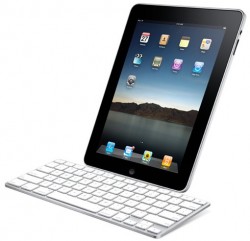 As this report so eloquently states, media is still best consumed with a mouse and keyboard, passive video, or with opposing hands leafing through pages of information. “Interactive media” as seen on the iPad is as useful as “multimedia CD-ROM dictionaries” from the 1990s, m’kay?
As this report so eloquently states, media is still best consumed with a mouse and keyboard, passive video, or with opposing hands leafing through pages of information. “Interactive media” as seen on the iPad is as useful as “multimedia CD-ROM dictionaries” from the 1990s, m’kay?
Now if you’re talking about entertainment, I’m all for gesture based interaction. But for straight consumption of information, give me visual ads, easy flowing editorial, and search.
[youtube]http://www.youtube.com/watch?v=Vsghn7OKvg8[/youtube]
When used properly, I think iPhones are nifty devices. Like all Apple hardware, including my two Macs, they have an impressive interface. Still, iPhones are probably the most overstated status device of the decade. Case in point: Apple’s latest “Did you get my email?” commercial (shown), which attempts to embellish and sell three bad behaviors “without ever leaving a call.” Let me tear ’em down for you, may I? Continue reading…
[youtube]http://www.youtube.com/watch?v=HrmF-mPLybw[/youtube]
The above ad is better than the Seinfeld mashup, but it doesn’t make using a PC feel any cooler. Plus, the soft response to Apple’s “I’m a Mac” ads only make me think of Apple, not Microsoft. Sorry, but again, this is fail.
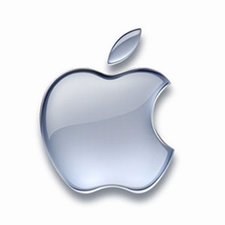 Newsweek has the story:
Newsweek has the story:
Apple is looking like what Microsoft was 10 years ago—a Bigfoot that squeezes smaller competitors. A former lieutenant of Steve Jobs’s once told me something surprising about his ex-boss. “Steve is a monopolist at heart,” he said. “He’s just like Bill Gates. He just hasn’t been as successful.”
Gone are the days where Apple was the hip underdog. Now they’re becoming the cool monopoly, and I’m fine with it so long as their products stay fresh and the prices remain competive.

Though I widely disagree with DeadBolt’s Top 10 picks (Beowulf? You cannot be serious), the movie portal makes a strong case for most of their selections, with Pixar rightfully sweeping the top five slots. As for me, Ratatouille is easily the greatest computer animated film ever made, and one of the best feature films of all time — animated or otherwise.
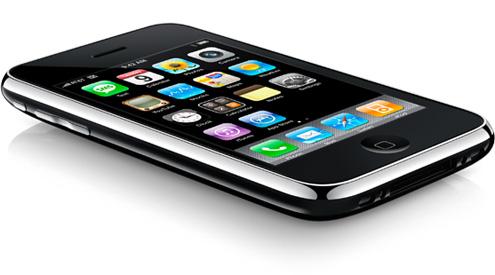
Unless they’ve fixed the faux keyboard, that is. Otherwise, 8GB + GPS + 3G + accelerometer + 2MP camera + iPod Video + iPhone + lengthy batter life for $199 with a two-year contract sounds really enticing.
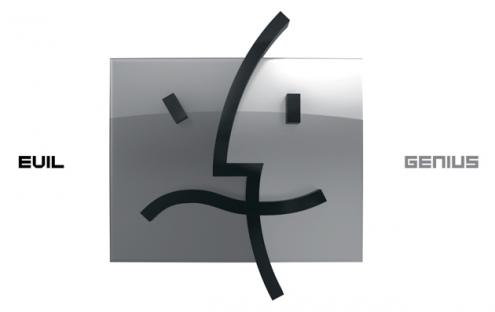
Contrary to popular belief suggesting that radical transparency is the best modern way to operate a business, Apple has circled its competition by being radically opaque, according to Wired Magazine.
No other company has proven as adept at giving customers what they want before they know they want it. Undoubtedly, this is due to Jobs’ unique creative vision. But it’s also a function of his management practices. By exerting unrelenting control over his employees, his image, and even his customers [while endorsing secrecy], Jobs exerts unrelenting control over his products and how they’re used. And in a consumer-focused tech industry, the products are what matter.
Though I believe Steve Jobs is a management anomaly, there’s obviously more than one way to make an honest buck. In any case, follow the Wired link for an insightful and challenging viewpoint on closed communication.
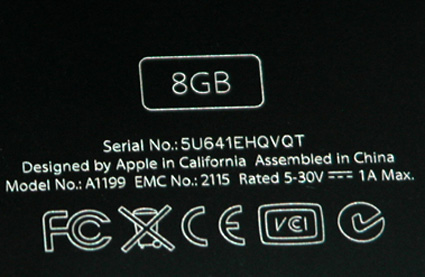
If you haven’t noticed, Apple prints “Designed by Apple in California” on the back every iPod and iPhone it sells, sometimes in a ridiculously tiny font size. Joel on Software tells why:
“These five words evoke a flurry of happy memories… Apple in California is, of course, on the literal level, a computer company, and not a very nice one, but put those words together and you think of apple orchards, and the Beatles, and you think of how Forrest Gump got rich off of Apple stock. And ‘designed in California…’ It’s not made. It’s designed. In California. Like a surfboard. Or a Lockheed XP-80.”
In short, California stands out by being the hippiest of all United States. And unlike its competitors, who outsource both product design and manufacturing overseas, Apple keeps its design rightfully in-house — at all times and at all costs. Continue reading…
Link
NOTE: I run XP on my desktop and OS X on my PowerBook.
Take it away, Mr. Jobs:
“We have decided to offer every iPhone customer who purchased an iPhone from either Apple or AT&T, and who is not receiving a rebate or any other consideration, a $100 store credit towards the purchase of any product at an Apple Retail Store or the Apple Online Store. Details are still being worked out and will be posted on Apple’s website next week… We want to do the right thing for our valued iPhone customers. We apologize for disappointing some of you, and we are doing our best to live up to your high expectations of Apple.”
Nice form. (Thanks, Nic!)
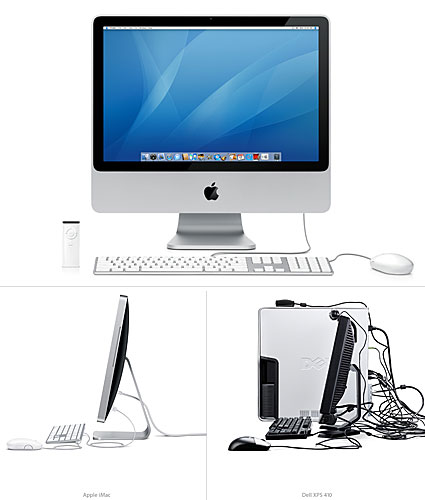
[youtube]http://www.youtube.com/watch?v=av6fWfmugds[/youtube]
Good stuff, though I like more DC IP than I do Marvel IP. Best line from the spoof — Superman says, “I might actually fight a supervillain in my next movie.”
See also: Novell spoofs both PC and Mac with Linux
JPigford writes “The Apple Blog makes claim that Apple sabotaged the success of the ROKR so as to sway public opinion of MP3 cell phones in general…ultimately to drive more sales to the iPod. By mandating a 100 song limit on the ROKR and having the product flop, Apple was able to put a bad taste in the mouths of consumers so that not only do they drive more iPod sales, but they keep competitors from fighting back with their own MP3 phones.”
Are you buying?
(Source: Slashdot)


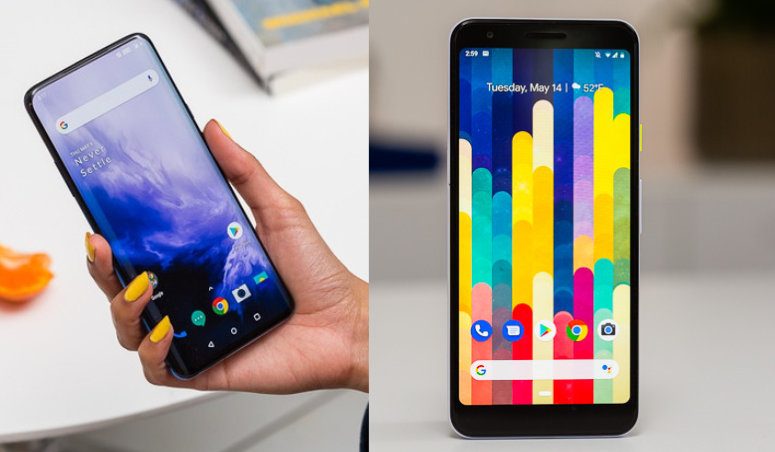
 “The reality is that calling a business a ‘tech company’ is a ploy to make it sound exciting to potential consumers and investors, not a method of assigning greater meaning,” aruges David Yanofsky
“The reality is that calling a business a ‘tech company’ is a ploy to make it sound exciting to potential consumers and investors, not a method of assigning greater meaning,” aruges David Yanofsky  For one reason or another—both personally and professionally—these companies can do almost no wrong in my eyes:
For one reason or another—both personally and professionally—these companies can do almost no wrong in my eyes:


 After six (sometimes) productive years, I abandoned the sinking ship that is BlackBerry last week. In it’s place, I upgraded to the “magical,” status-enhancing iPhone.
After six (sometimes) productive years, I abandoned the sinking ship that is BlackBerry last week. In it’s place, I upgraded to the “magical,” status-enhancing iPhone.






 As
As  Newsweek
Newsweek 



